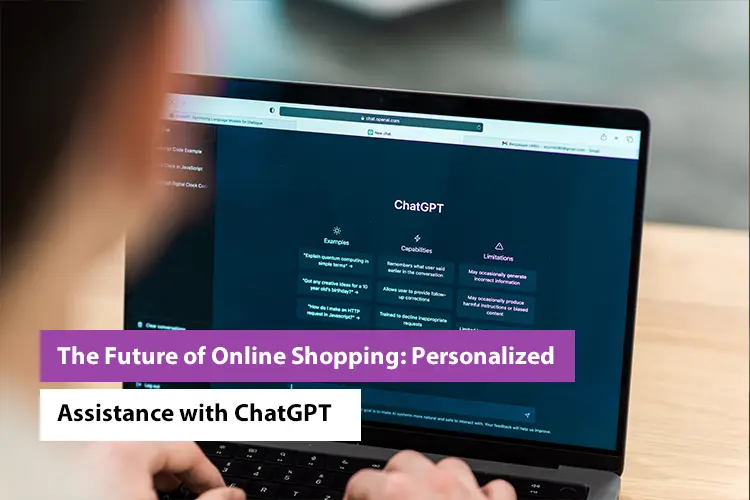The Future of Online Shopping: Personalized Assistance with ChatGPT

The world of e-commerce has seen tremendous growth over the past few decades, with more and more consumers opting to shop online for convenience, variety, and competitive pricing. However, as online shopping continues to evolve, so do consumer expectations. One of the key trends shaping the future of e-commerce is the integration of artificial intelligence (AI) and natural language processing (NLP) technologies to offer personalized assistance to shoppers. Among these technologies, ChatGPT, an AI language model developed by OpenAI, is poised to play a significant role in transforming the online shopping experience.
In this blog post, we’ll explore the potential of ChatGPT in revolutionizing online shopping, its benefits for both consumers and businesses and the challenges and considerations associated with implementing personalized assistance in e-commerce.
The Rise of Personalized Assistance in E-Commerce

In the ever-evolving landscape of e-commerce, personalized assistance is emerging as a pivotal factor in shaping the shopping journey of consumers worldwide. This section delves into the various dimensions of this phenomenon, exploring its significance and implications for both consumers and businesses alike.
Consumer Expectations in the Digital Age
In today’s digital era, consumers are accustomed to personalized experiences across various online platforms, from social media to streaming services. As a result, they expect the same level of customization and tailored recommendations when it comes to their shopping experience. Personalized assistance addresses this growing demand by leveraging AI technologies to understand individual preferences, behavior, and context, thereby enhancing user satisfaction and loyalty.
Advancements in AI and Natural Language Processing
The rapid advancements in AI and natural language processing have paved the way for the integration of personalized assistance in e-commerce. Technologies like ChatGPT, powered by deep learning algorithms, have demonstrated remarkable capabilities in understanding and generating human-like text. By analyzing vast amounts of data, including customer interactions and browsing history, these AI-driven systems can offer real-time assistance and recommendations tailored to each user’s unique needs and preferences.
Customized Recommendations and Guidance
Personalized assistance enables e-commerce platforms to offer customized recommendations and guidance throughout the shopping journey. Whether it’s suggesting relevant products based on past purchases, recommending complementary items, or providing expert advice, AI-driven chatbots like ChatGPT can simulate the personalized assistance traditionally associated with in-store shopping experiences. This level of customization not only increases the likelihood of conversion but also fosters a deeper connection between consumers and brands.
Enhanced User Engagement and Satisfaction
By providing personalized assistance, e-commerce platforms can significantly enhance user engagement and satisfaction. When consumers feel understood and supported throughout their shopping journey, they are more likely to stay longer on the website, explore additional products, and ultimately make a purchase. This positive interaction not only strengthens brand loyalty but also encourages repeat business, driving long-term success for e-commerce businesses.
Real-time Support and Accessibility
One of the key advantages of personalized assistance is its ability to provide real-time support and guidance to consumers. Unlike traditional customer service channels that may have limited availability, AI-driven chatbots like ChatGPT are accessible 24/7, ensuring that users can receive assistance whenever they need it. This round-the-clock support enhances accessibility and convenience, catering to the needs of today’s on-the-go consumers.
Data-driven Insights for Business Growth
Personalized assistance generates valuable data insights that can inform strategic decision-making and drive business growth. By analyzing customer interactions, preferences, and behavior, e-commerce businesses can gain actionable insights into trends, patterns, and opportunities. These insights enable businesses to refine their marketing strategies, optimize product offerings, and personalize the shopping experience further, ultimately driving sales and revenue.
Building Trust and Loyalty
Ultimately, personalized assistance plays a crucial role in building trust and loyalty between consumers and brands. By delivering relevant recommendations, addressing customer inquiries promptly, and providing personalized support, e-commerce platforms demonstrate a commitment to meeting the individual needs of their customers. This personalized approach fosters trust, loyalty, and advocacy, turning satisfied customers into brand advocates and ambassadors.
The rise of personalized assistance in e-commerce represents a paradigm shift in the way consumers interact with online shopping platforms and engage in the shopping process. By harnessing the power of AI and natural language processing, e-commerce businesses can deliver tailored recommendations, guidance, and support, ultimately enhancing user satisfaction, driving sales, and fostering long-term loyalty. As technology continues to evolve, personalized assistance will undoubtedly play an increasingly integral role in shaping the future of e-commerce.
Benefits of Personalized Assistance with ChatGPT

Personalized assistance with ChatGPT, an AI-driven chatbot developed by OpenAI, offers a plethora of benefits for both consumers and businesses in the realm of e-commerce. This section explores in detail the various advantages of leveraging ChatGPT to deliver tailored recommendations, address customer inquiries, and enhance the overall shopping experience.
Enhanced User Experience
Personalized assistance with ChatGPT significantly enhances the user experience by providing tailored recommendations and guidance based on individual preferences and browsing history. By analyzing data such as past purchases, product views, and search queries, ChatGPT can offer relevant suggestions that resonate with each user’s unique interests and preferences. This personalized approach fosters a sense of engagement and satisfaction, ultimately leading to a more enjoyable and fulfilling shopping experience for consumers.
Improved Conversion Rates
By offering personalized recommendations and addressing customer inquiries in real time, ChatGPT helps improve conversion rates for e-commerce businesses. When shoppers receive relevant product suggestions and timely assistance throughout their shopping journey, they are more likely to complete their purchases and convert into paying customers. This translates into increased sales and revenue for businesses, making personalized assistance with ChatGPT a valuable asset in driving business growth.
24/7 Availability
Unlike human customer service representatives who may have limited availability, ChatGPT provides round-the-clock assistance to shoppers. This 24/7 availability ensures that customers can receive support and guidance whenever they need it, regardless of time zones or geographic location. As a result, businesses can cater to the needs of their global customer base and deliver consistent and reliable service, thereby enhancing customer satisfaction and loyalty.
Cost-Efficiency
Implementing personalized assistance with ChatGPT can result in cost savings for e-commerce businesses. Unlike hiring and training human customer service agents, deploying AI-driven chatbots incurs lower overhead costs and can handle a larger volume of customer inquiries simultaneously. This cost-efficiency not only reduces operational expenses but also enables businesses to scale their customer support efforts more effectively, especially during peak periods or seasonal fluctuations in demand.
Data Insights and Analytics
ChatGPT collects valuable data on customer interactions, preferences, and behavior, providing businesses with actionable insights to improve their marketing strategies and product offerings. By analyzing this data, businesses can identify trends, anticipate customer needs, and personalize their marketing campaigns more effectively. Additionally, ChatGPT’s analytics capabilities enable businesses to track key metrics such as conversion rates, customer satisfaction scores, and retention rates, allowing them to measure the impact of personalized assistance on their overall performance and make data-driven decisions to drive continuous improvement.
Scalability and Flexibility
ChatGPT offers scalability and flexibility, allowing businesses to adapt to changing customer needs and market conditions. As the volume of customer inquiries increases, businesses can easily scale their chatbot infrastructure to handle higher demand without compromising on the quality of service. Moreover, ChatGPT can be trained and customized to support various languages, dialects, and industry-specific terminology, making it suitable for a wide range of e-commerce applications and use cases.
Competitive Advantage
By leveraging personalized assistance with ChatGPT, businesses can gain a competitive advantage in the crowded e-commerce landscape. Offering a seamless and personalized shopping experience sets businesses apart from their competitors and enhances brand differentiation. Moreover, satisfied customers are more likely to recommend the brand to others and become repeat purchasers, further solidifying the business’s market position and driving sustainable growth in the long run.
Challenges and Considerations in Implementing Personalized Assistance with ChatGPT

While the adoption of personalized assistance with ChatGPT offers numerous benefits for e-commerce businesses, it also presents several challenges and considerations that must be addressed to ensure its successful implementation. This section explores these challenges in detail and provides insights into how businesses can navigate them effectively.
Privacy and Data Security
One of the primary concerns associated with personalized assistance with ChatGPT is the collection and use of customer data. E-commerce businesses must prioritize the protection of customer information and ensure compliance with data privacy regulations such as GDPR. This includes implementing robust security measures to safeguard sensitive data, obtaining explicit consent from users before collecting their data, and being transparent about how their data will be used.
Accuracy and Reliability
While ChatGPT demonstrates remarkable capabilities in understanding and generating human-like text, it may not always provide accurate or reliable responses, especially in complex or ambiguous situations. E-commerce businesses must invest in ongoing training and fine-tuning of their chatbots to improve their accuracy and effectiveness over time. This includes regularly updating training data, refining algorithms, and implementing quality control mechanisms to ensure that ChatGPT delivers reliable assistance to users.
Maintaining Human Touch
Despite advancements in AI technology, ChatGPT may lack the empathy and emotional intelligence of human customer service agents. E-commerce businesses must strike a balance between automation and human intervention to maintain a personalized and empathetic shopping experience. This may involve integrating ChatGPT with live chat support systems staffed by human agents who can step in to handle complex inquiries or provide personalized assistance when needed.
Integration with Existing Systems
Implementing personalized assistance with ChatGPT requires seamless integration with existing e-commerce platforms, customer relationship management (CRM) systems, and other backend systems. E-commerce businesses must invest in robust integration solutions to ensure a smooth and cohesive shopping experience for customers. This includes integrating ChatGPT with product catalogs, inventory management systems, and order processing systems to provide accurate and up-to-date information to users.
Ethical Considerations
As AI technologies become more prevalent in e-commerce, there are ethical considerations regarding the use of AI-driven chatbots. E-commerce businesses must prioritize ethical AI practices and ensure that their chatbots adhere to ethical guidelines and standards. This includes addressing issues related to bias, transparency, and accountability, and implementing measures to mitigate potential risks such as algorithmic discrimination or unintended consequences of AI-powered decision-making.
User Experience and Adoption
Personalized assistance with ChatGPT should enhance, rather than detract from, the overall user experience. E-commerce businesses must carefully design the user interface and interaction flow to ensure that ChatGPT seamlessly integrates into the shopping journey. This includes providing clear instructions, intuitive navigation, and contextual assistance to help users interact with ChatGPT effectively. Moreover, businesses must actively promote the adoption of ChatGPT among users and educate them on its capabilities and benefits to encourage widespread adoption and usage.
Continuous Improvement and Innovation
Implementing personalized assistance with ChatGPT is not a one-time effort but an ongoing process of continuous improvement and innovation. E-commerce businesses must regularly monitor and evaluate the performance of ChatGPT, gather feedback from users, and iterate on its design and functionality to address evolving customer needs and preferences. This includes leveraging analytics data to identify areas for improvement, experimenting with new features and capabilities, and staying abreast of emerging trends and best practices in AI-driven customer service.
Conclusion:
Personalized assistance with ChatGPT represents a significant opportunity for e-commerce businesses to enhance the online shopping experience and drive customer engagement and loyalty. By leveraging AI-driven chatbots to offer tailored recommendations, answer customer queries, and provide real-time assistance, businesses can improve conversion rates, increase sales, and gain valuable insights into customer behavior.
However, the successful implementation of personalized assistance with ChatGPT requires careful consideration of privacy, accuracy, human touch, integration, and ethical considerations. By addressing these challenges and leveraging the capabilities of AI technology responsibly, e-commerce businesses can unlock the full potential of personalized assistance and shape the future of online shopping for years to come.
We’re honored to mention that our efforts have been recognized by renowned B2B review and research platforms such as GoodFirms, Clutch, MirrorView, and many more.
Want more information about our services?
Similar Posts

Top Healthcare Software Trends to Watch Out for in 2023
Who would have imagined that telemedicine, formerly regarded to be nearly unachievable, might finally become a reality? Yet it has! To stay up with the most recent trends and advancements, the healthcare sector is quickly adapting as technology advances. While many new technologies and solutions powered by Artificial Intelligence (AI) and biomedical engineering will be […]...

How to Reduce Development Costs Without Sacrificing Quality
Every business is seeking answers to a critical question: How to reduce software development costs without compromising quality? Does a business spend too much money to get perfection, or cut corners and risk mediocre results? Are there ways to optimize for both? Think about it: what if you can cut costs, speed up development, and […]...

How to Build Custom ERM Software From Scratch
Have you ever felt like your business is juggling too many balls at once, struggling to keep up with the ever-increasing demands of the modern marketplace? In a world where data is the currency of success, how can you ensure your organization not only survives but thrives amidst the chaos? Imagine having a tool that’s […]...









